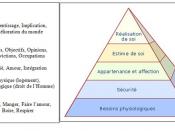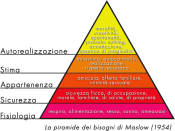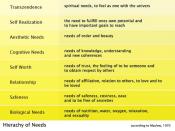Abraham Maslow is a well-known psychologist for his theory on human motivation, specifically the Hierarchy of needs theory, and for his work with monkeys. Maslow's theory can also be defined as "intensity at a task". This means that greater the motivation, the more constant and intense one will perform s specific task. The basis behind this theory is the knowledge that all behaviour is goal driven, meaning one will do tasks according to what they obtain after the task is complete. Maslow has been a very inspirational figure in personality theories.
The Hierarchy of Needs theory has four different levels before one comes to full self-actualizing. These levels are, in order, the psychological needs, safety, love and care and esteem needs. The psychological needs are those one needs to survive, such as food, water, oxygen, shelter and more. Then comes the need for safety and protection for one's family' these needs include safe shelter, security, protection from both mental and physical damage, and others.
Thirdly is the need for love and care, which is the need for affection, friends and relationships in general. Lastly, the esteem needs. These needs are those that one gets from him or herself. There are two types, low self esteem and a high self esteem. The low self esteem needs include wanting the respect of others, status, fame, recognition and even dominance. The high self-esteem need is to have respect for yourself; this is the higher of the two self-esteems because self-respect is harder to loose than the respect of others.
Self-actualization is to have all of the needs fulfilled and to be settled with a good job. According to Maslow, a person who is fully self-actualized, have the following character traits. According to his research, e stated that self-actualizers tend to be reality centred,



Good
Well written.
0 out of 0 people found this comment useful.